7 Easy Ways to Banish Black Urine Stains from Hardwood Floors
How to remove black urine stains from hardwood floors? Black urine stains are a pain in the neck. Not only do they look unsightly, but they also give off a horrendous odor. Despite your considerable effort, it does not seem to go away at all.
I understand your concern if this is what you are going through. However, there’s no need to plunge into a panic attack; it is possible to clean black urine stains from your flooring, and all it takes are a few household ingredients. Keep reading if you have doubts about my words!

A Black Day With Black Urine Stains
What are black urine stains, and where the hell did they come from and ruin your day? Well, as per the name, these stains are a by-product of your pet’s urine. When it’s deposited onto your hardwood floors, it has a low pH level, which means a high acidity level.
Over time, the urine will begin to dry and steadily turn into an alkaline, which has a pH level of 10-12. At this point, the original acid content will go through oxidation and react with your flooring surface, resulting in a color change.
These stains, without prompt actions, will likely become permanent. Also, when the humidity is high, they will stink up terribly. The odor is derived from the salt crystals found in the urine, which attract water and become evaporated when the conducive conditions are met.
Forget the scientific talk; in short, black urine stains don’t deserve to be in your lovely house and have to leave immediately. But, how will you do that? Will they let your hardwood floors go that easy? This section will provide you with the ultimate solutions.
Clean Black Urine Stains On Your Hardwood Floors
To most people, the very first line of defense against stains is a commercial product. While it is true that such products are useful, they usually contain harsh chemicals, and the chances are that you are causing further damage to your hardwood floors.
This post will take you on a more natural, eco-friendly route, and the result is just as fulfilling. Feel free to experiment with different methods and see which one works best for you – well, in case your furry friend decides to urinate again in the future!
Before getting started, you will need to clean your hardwood floors first. From vacuuming to mopping, there are plenty of methods for your consideration. Or, perhaps the most effortless approach is to use a microfiber cloth and give the surface a quick wiping.
Now, you are all set! Let’s get down to work right away!
1. Hand Scraper
If the damage is minor, a hand scraper is all you need. However, using this tool will demand extreme caution. When the scraper goes too deep, it can damage the finish of your flooring, and the price you have to pay for the damage is costly.
To use a hand scraper, apply gentle but enough pressure so that the bottom edge becomes slightly curved. For a smooth result, avoid scraping against the grains. Unlike sanding, this method produces small wood shavings instead of dust, which makes cleaning (somewhat) easier.

2. Sandpaper
Another implement that works in the same manner is fine-grit sandpaper. Still, this approach requires refinishing. The cost of refinishing your hardwood floors is often pricey and depends on many factors, such as the project range, the finish type, and more, so consider this option carefully.
If your hardwood floors have not been sanded for a long time, you will want to start with a 36-grit product. After sanding, ensure that you run the shop vac over the area to eliminate the wood dust particles, or they will float in the air and irritate your eyes, nose, and throat.(1)
Note: Sanding can be combined with the wood bleach method, which will be introduced later in this post.

3. Hydrogen Peroxide
Aid in your cleaning job with hydrogen peroxide, the absolute cleaning agent that works like a charm on carpet stains. You can expect the same result when using it to treat urine stains on your hardwood floors, thanks to its mild acidic content.

Tools And Ingredients
- Hydrogen peroxide 3%
- Water
- Microfiber cloths
- Gloves
Cleaning Instructions
Step 1: Combine a gallon of bucket with a few drops of hydrogen peroxide.
Step 2: Dip a microfiber cloth into the hydrogen peroxide solution. You will want to put on a pair of gloves while doing so since the product can burn your skin. (2)
Step 3: Wipe the dark stains with the solution and leave it on for a few hours. It will dissolve the salt crystals in the urine and lift the stains.
Step 4: Give the area another good wiping to wick away the moisture and let your floors dry.
Let hydrogen peroxide save the day and send the dark urine stains away.
4. Baking Soda
Baking soda is a cleaning champion, and you can’t deny that. With its absorbent qualities, it can suck up moisture with lightning speed. However, what makes this choice more than just excellent is its capabilities to disperse the smell – it works great for removing bedroom odors as well!

Tools And Ingredients
- Baking soda
- Hydrogen peroxide
- Dishwashing detergent
- Microfiber cloths
- Bowl
Cleaning Instructions
Step 1: Sprinkle a film of baking soda on the affected area to absorb the remaining moisture. Then, wipe the paste away with a clean microfiber cloth.
Step 2: Take baking soda’s cleaning power up a notch by employing hydrogen peroxide and mild dish soap. Combine the ingredients in a bowl and give it a stir to dissolve.
Step 3: Smear the paste onto the urine spot and allow it to sit for a few minutes.
Step 4: With another washcloth, lift the paste and be amazed by the result.
5. Dishwashing Detergent
Dishwashing detergent has your back, be it cleaning baked-on grease or smelly urine stains on your precious flooring. The result is more than just good, and rest assured that the result will take you aback.

Tools And Ingredients
- Dishwashing detergent
- Vinegar or baking soda
- Microfiber cloths
Cleaning Instructions
Step 1: Dish soap alone won’t be enough for tackling such stubborn stains. Thus, step up its cleaning power with half a cup of vinegar or a sprinkling of baking soda. For the latter option, mix the ingredients until a paste is formed.
Step 2: Grab a microfiber cloth and rub the urine stain with the vinegar solution. Proceed the same with the bubbly paste composed of baking soda and dish soap.
Step 3: After a few minutes, the stain should lighten or disappear. Wash away the solution or paste with clean water and let it dry.
6. Vinegar
Another household staple you can resort to when the incident occurs is vinegar. With its high acidity, vinegar can clean paint out of carpet and other stubborn stains like wine, grease, and other stubborn stains effectively. You will notice that the smell will be gone, too!

Tools And Ingredients
- Vinegar
- Water
- Microfiber cloth
- Grapefruit oil (optional)
Cleaning Instructions
Step 1: Straight vinegar is a little strong, so you will need to dilute it with water in a 1:1 ratio. For a more pleasant effect, add a few drops of grapefruit oil to the solution.
Step 2: Wet a microfiber cloth with the solution and apply it to the stain. Let it stand for a few minutes.
Step 3: Finish your cleaning work with a thorough wipe to get rid of the solution.
7. Enzymatic Cleaner
When natural remedies have yielded somewhat disappointing results, it’s time to bring out a commercial product. In this case, it’s an enzyme-based cleaner, which is just what you need for cleaning pet poop and urine from carpets.
Tools And Ingredients
- Enzymatic cleaner
- Microfiber cloth
Cleaning Instructions
Not every enzymatic cleaner is created equally the same, so refer to the label for everything you need to know about the application and removal instructions. Typically, you will saturate a microfiber cloth with the cleaner, apply it to the stain, and rinse away afterward.
Enzyme cleaners are here to change your life for the better – no regrets. You can see this video to know more:
8. Wood Bleach
As a last-ditched method, you will have to use wood bleach. Similar to chlorine bleach, it’s a toxic chemical and will release harmful airborne chemicals, so you are well-advised to work with it in a ventilated space with an air mask and gloves on.
Tools And Ingredients
- Wood bleach
- Microfiber cloth
Cleaning Instructions
Pour a small amount of wood bleach on a microfiber cloth (preferably white and color-fast), then apply it to the affected spot with utter caution. For the following steps, check the label and follow the same instructions. The black urine stains should be gone immediately!
When even bleach fails your expectations, commercial stain removers like OXALIC Acid is your very last choice. Alternatively, you can contact a professional and let them handle the job if you don’t want to risk ruining your pristine hardwood floors.
Say goodbye to black urine stains with these excellent products.
The Ultimate Solution To Prevent Black Urine Stains
Perhaps the best way to clean these stains is to stop your pets from taking a leak right from the start. The following tricks will teach you how to dismiss or at least reduce the possibility in order to keep your flooring spotless. Let’s dive in!
- Spay/neuter your pet: Unneutered animals have a bad habit of marking their zones by urinating. The only way to kick it is to spay or neuter them. Spaying and neutering can also boost their health system significantly.
- Place more potty breaks: Animals are not like humans, and they will break the seal wherever they feel like it’s suitable. The issue, however, can be remedied by allowing your pet to go outside every hour for a quick whizz.
- Train your pet: Indeed, this sounds easier said than done, particularly when you are talking about urinating habits. However, it is not nearly impossible so long as you are dedicated and patient enough. And, here’s a fun fact: there are litter boxes for dogs, too!
- Visit the vet: Excessive urination is not always a habit. At times, it can be a sign of a more serious medical problem, such as diabetes, bladder stones, or tumor. Hence, don’t hesitate to take your dog or cat to the vet for a quick check-up.
- Take action promptly: The success of your cleaning work will also depend on how quickly you act. Moreover, if you don’t clean the stains thoroughly, the ammonia odor will attract your dog or cat, causing them to repeat the history.

FAQs
Black urine stains not only leave you with a gigantic mess but also with tons of questions. If you are in search of the answers, they are all right here. Check them out!
Bring Back The Refreshing Scent To Your Floors
Yes, that’s all about how to remove black urine stains from hardwood floors. Whatever option you go for, I’m confident that success is in your hands. Your hardwood surface will soon glow with style again!
Should the smell linger, smear a paste made of vinegar and baking soda on the working site, and the odor should dissipate hours later. A commercial pet odor removing product will work just as great!
So, my friends, I hope that everything is clear as day for you now. Should you have more tips or questions, don’t be afraid to comment below. I will do my best to ensure that your floorings are at their best!

References
- Wood Dust – Health Effects: OSH Answers. (2022). Retrieved from https://www.ccohs.ca/oshanswers/chemicals/wood_dust.html
- Can hydrogen peroxide treat skin conditions?. (2022).


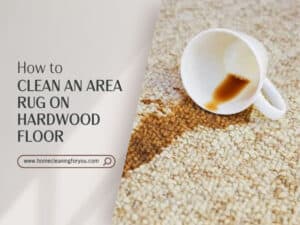
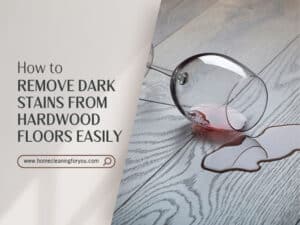
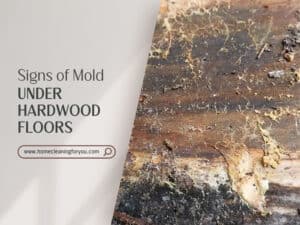
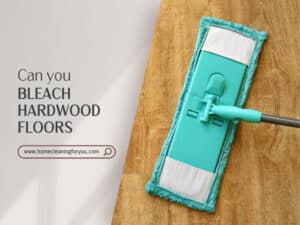
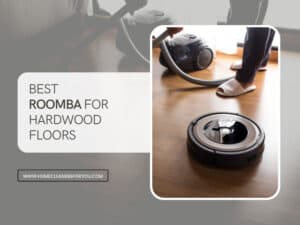
Samantha Lee
Head Cleaning Expert
Expertise
Professional Home Cleaning, Green Cleaning Techniques, Stain Removal & Fabric Care, DIY Home Maintenance & Organization, Sustainable Cleaning Products, Home Care for Busy Lifestyles
Education
University of Denver
Samantha Lee is the Head Cleaning Expert at HomeCleaningForYou.com, specializing in eco-friendly home care. She holds a Bachelor of Science in Environmental Science from the University of Denver, focusing on sustainable cleaning solutions.
With expertise in green cleaning, stain removal, and DIY home maintenance, she helps homeowners keep their spaces fresh and chemical-free. Samantha has been featured in lifestyle publications and has partnered with brands promoting natural cleaning products.
She also shares practical tips through her blog, online courses, and workshops. Passionate about sustainability, she enjoys testing new eco-friendly cleaning methods and spending time outdoors.